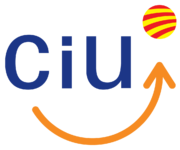Convergence and Union Convergència i Unió | |
|---|---|
 | |
| Abbreviation | CiU |
| President | Artur Mas |
| General Secretary | Ramon Espadaler |
| Founded | 19 September 1978 (coalition) 2 December 2001 (federation) |
| Dissolved | 18 June 2015 |
| Preceded by | Democratic Pact for Catalonia Democracy and Catalonia |
| Succeeded by | Junts pel Sí |
| Headquarters | C/ Còrsega, 331-333 08037, Barcelona |
| Ideology | |
| Political position | Centre[10][4][11] to centre-right[16] |
| National affiliation | Galeusca (2004–2009) Coalition for Europe (2009–2014) Coalition for Europe (2014–2019) |
| European affiliation | Alliance of Liberals and Democrats for Europe (CDC) European People's Party (UDC) |
| European Parliament group | ALDE Group (CDC) EPP Group (UDC) |
| International affiliation | Liberal International (CDC) Centrist Democrat International (UDC) |
| Colours | Dark blue (customary) Orange (official) |
| Website | |
| www | |
Convergence and Union (Catalan: Convergència i Unió, CiU; IPA: [kumbəɾˈʒɛnsi.əj uniˈo]) was a Catalan nationalist electoral alliance in Catalonia, Spain. It was a federation of two constituent parties, the larger Democratic Convergence of Catalonia (CDC) and its smaller counterpart, the Democratic Union of Catalonia (UDC). It was dissolved on 18 June 2015.
CiU was a Catalan nationalist coalition. During its lifespan, it was usually seen as a moderate nationalist party in Spain, although a significant part of its membership had shifted to open Catalan independentism during the party's last years, and by 2014 demonstrated its intention to hold a referendum on Catalan independence. There is some debate as to whether the coalition was conservative[17] or centrist. Liberal tendencies dominate the larger CDC, while the smaller UDC is a Christian democratic party.[18] As for its position in the nationalist debate, it was deliberately ambiguous so as to appeal to the broadest spectrum possible, from voters who seek full independence from Spain to those who are generally satisfied with the present self-government status. In general, the CDC tends to be more supportive of Catalan sovereignty, while the UDC is considered closer to traditional Catalan autonomism and more nuanced nationalism. The electoral manifesto for the elections in 2012 states that "we want to build a wide social majority so that Catalonia can have its own State in the European frame, because Catalonia has the will to become a normal country among world's countries and nations".
In the 2012 regional elections, CiU won 30.71% of the vote. It lost 12 seats in the Catalan Parliament, bringing them to a total of 50 deputies. While they have more than twice as many deputies as any other party, they were left 18 seats short of a majority in the 135-member body. After the election, they entered into coalition with the Republican Left of Catalonia (ERC), which has a completely different political orientation but also supports Catalan independence. El Periódico de Catalunya reported in August 2013 that the coalition may break apart due to fractions within the union about Catalan independence, with UDC opposing secessionism.[19]
On 18 June 2015 CDC spokespersons declared the CiU federation "finished", albeit amenable to an "amicable" separation. This occurred after an ultimatum had been issued by President Mas to UDC, due to their diverging positions on the Catalan independence process.[20]
- ^ a b c d Dowling, Andrew (2005), "Convergència i Unió, Catalonia and the new Catalanism", The Politics of Contemporary Spain, Rotledge, p. 106
- ^ a b Bukowski, Jeanie (2003), "Party Politics and Regional Strategies in Spain", Between Europeanization and Local Societies: The Space for Territorial Governance, Rowman & Littlefield, p. 173
- ^ Hepburn, Eve (2009), "Degrees of Independence: SNP Thinking in an International Context", The Modern SNP: From Protest to Power, Edinburgh University Press, p. 199
- ^ a b c Smith, Angel (2009), Historical Dictionary of Spain, Scarecrow Press, pp. 199–202
- ^ a b Pallarés, Francesc; Keating, Michael (2006), "Multi-level electoral competition: sub-state elections and party systems in Spain", Devolution and electoral politics, Manchester University Press
- ^ Schrijver, Frans (2006), Regionalism after Regionalisation, Vossiuspers, Amsterdam University Press, p. 112
- ^ Valandro, Franz (2002), A Nation of Nations: Nationalities' Policies in Spain, Peter Lang, p. 83
- ^ Gibbons, John (1999), Spanish politics today, Manchester University Press, p. 51
- ^ McNeill, Donald (1999), Urban Change and the European Left: Tales from the New Barcelona, Routledge, pp. 92, 184
- ^ Paluzie, Elisenda (2010), "The costs and benefits of staying together: the Catalan case in Spain", The Political Economy of Inter-Regional Fiscal Flows: Measurement, Determinants and Effects on Country Stability, Edward Elgar Publishing, p. 366
- ^ Wiarda, Howard J.; Macleish Mot, Margaret (2001), Catholic Roots and Democratic Flowers: Political Systems in Spain and Portugal, Greenwood, p. 138
- ^ Colomer, Josep Maria (2002). Political institutions in Europe. Routledge. p. 183. ISBN 9780415267908. Retrieved 24 November 2011.
- ^ Znojek, Bartłomiej (18 November 2011). "Parliamentary Elections in Spain". PISM Bulletin. 104 (321). The Polish Institute of International Affairs. Archived from the original on 26 April 2012. Retrieved 24 November 2011.
- ^ "Spain: Political structure". The Economist. 17 July 2009. Retrieved 24 November 2011.
- ^ Connor, Richard (29 November 2011). "Catalan election result deals blow to embattled Spanish government". DW World. Retrieved 24 November 2011.
- ^ [12][13][14][15]
- ^ Sturcke, James (7 June 2006). "Catalan conundrum". The Guardian. London.
- ^ Hough, Dan; Jeffery, Charlie (2006). Devolution and Electoral Politics. Manchester: Manchester University Press. p. 101. ISBN 978-0-7190-7330-4.
- ^ Barcelona, FIDEL MASREAL / (19 August 2013). "Unió ya piensa en una candidatura al margen de CDC". elperiodico.
- ^ "Convergència enterra la federació: "El projecte polític de CiU s'ha acabat i cal una separació amistosa"". Ara.cat. 18 June 2015.